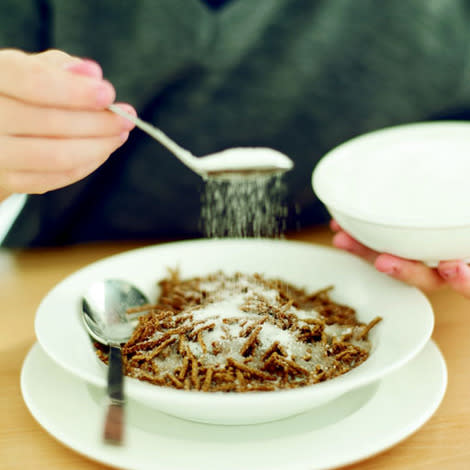The Truth About 4 Natural Sweeteners

It's not exactly news that eating too much sugar can wreak havoc on your health (and, not to mention, your waistline). But for those of you who crave the sweet stuff, there's good news: Natural sweeteners can be just as delicious (and sometimes much healthier) than regular sugar. That said, that doesn't give you the go-ahead to add natural sweetness to your food--not all natural sweeteners are created equal, and sweetening your dish can make you crave extra sweet things later in the day. Here, the truth about natural sweeteners.
Agave
Agave comes from large, spiky, cactus-like plants, which are also used to make tequila. Although agave starts out as a natural substance, the form you find in stores has been processed to form a syrup or nectar. Nutritionally, it does contain small amounts of calcium, potassium, and magnesium, but not enough to really make a nutritional impact. Agave is touted for its low glycemic index, though it should still be consumed in moderation, especially by diabetics. (Does diabetes run in your family? 7 Ways to Slash Your Diabetes Risk.)
As sweet as: The taste of agave is said to be similar to honey, and it is 1.5 times sweeter than sugar
Calories per serving: About 60 calories per tablespoon
May be better than sugar because… Agave is slightly more caloric than sugar, but since it is 1.5 times sweeter, you can actually use less of it to achieve the same level of sweetness. That sweetness comes from agave's percentage of fructose, which is sweeter than glucose. Like high-fructose corn syrup (HCFS), agave has a higher fructose-glucose ratio than regular sugar. Some studies have found that excess fructose consumption can cause long-term liver damage, elevated cholesterol, and high blood pressure. The bottom line is, despite the recent health buzz, agave syrups and nectars are no different from sugar, honey, high-fructose corn syrup, or any other sweetener. Use them in moderation.
Chicory
Chicory is derived from the root of a perennial plant. It has an impressive dose of B vitamins and contains trace amounts of vitamins A and C. It's extremely high in soluble fiber and contains many essential minerals, such as manganese, phosphorous, potassium, iron, magnesium, calcium, copper, and a small amount of sodium, zinc, and selenium. (Are you getting enough nutrients in your diet? When to consider taking one of the 18 Best Supplements for Women.) Studies show that it may prevent constipation, maintain a healthy balance of bacteria in the colon, and lower blood cholesterol levels. Like Agave, it also has a very low glycemic index.
As sweet as: Sweetness varies by brand. Check the label to see whether the sweetener contains just chicory, or other added sugars or alcohols as well.
Calories per serving: One chicory root has 43 calories, but some chicory-based sweeteners contain very small amounts of the herb itself and may be calorie-free.
May be better than sugar because… It is derived from a natural process and less likely to raise blood sugar levels because of its low glycemic index.
Stevia
Stevia is derived from the stevia plant, an herb native to South America. The leaf of the stevia plant contains compounds that give it sweetness. Some studies suggest stevia may help to lower high blood pressure.
As sweet as: Stevia can be up to 300 times sweeter than sugar
Calories per serving: 0 calories per packet/tablespoon
May be better than sugar because… Stevia has no impact on blood sugar and is virtually calorie-free. By comparison, table sugar spikes blood glucose levels and contains 40 calories per tablespoon. (Learn exactly How Sugar Harms Your Body.)
Monk fruit
Monk fruit is a type of small melon found in the tropical and subtropical regions of South East Asia. Its sweetness comes from antioxidants called mogrosides, which are found exclusively in monk fruit. It is said to support the immune system, digestive tract, glands, and respiratory system.
As sweet as: Monkfruit is 150-200 times sweeter than sugar
Calories per serving: 0 calories per tablespoon
May be better than sugar because… Like stevia, monkfruit is an all-natural, calorie-free sweetener with zero glycemic index. And, since it is so much sweeter than sugar to taste, you can use a lot less to achieve the same level of sweetness.
Ultimately, when it comes to sweeteners, your goal should be to eat as little as possible--or none at all. See, when you sweeten food, even with some of these more natural options, your body will continue to crave sweets and you just may eat more later in the day. (Got a sweet tooth? Learn How to Fight Sugar Cravings.)
But okay, I get it: If you need to sweeten up your food from time to time, aim for a natural option, rather than an artificial sweetener. And remember to use the smallest amount possible. Or, skip it altogether, eat your non-sweet food as it is meant to be eaten, and make a conscious indulgence in a real sweet treat from time to time. My personal favorite: a piece of really good dark chocolate. Aim for cocoa content of at least 70 percent to get the full health benefits.
--By Keri Glassman, R.D. Women's Health
More From Women's Health:
5 Fatty Foods That Make You Skinny
Is Sugar Sneaking Into Your "Healthy" Foods?
15 Celebrities With Diabetes


